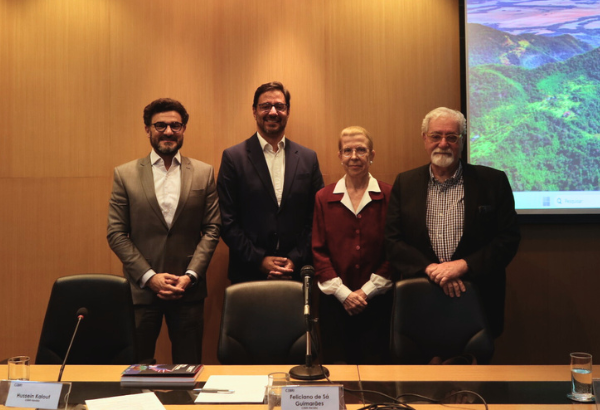CEBRI-Journal launches its 14th issue at the Institute of International Relations at USP
- Institutional
- 01 october 2025
On September 30, CEBRI held the launch event in São Paulo for the 14th issue of CEBRI-Revista, titled "Trump and the Global Order: Rupture or Reconfiguration?" The meeting brought together experts and authorities who discussed recent transformations in the international order and their impact on Brazilian foreign policy.
The opening was led by CEBRI's Academic Director and Editor-in-Chief of the CEBRI-Journal, Feliciano de Sá Guimarães, who presented the edition's proposal: to promote an in-depth reflection on Brazil's relationship with the United States, based on a collective effort by several authors.
Next, Hussein Kalout, also Editor-in-Chief of CEBRI-Journal, emphasized that Brazil has never structured a defensive foreign policy toward the United States, although there is currently a consolidated ideological current in this field. He noted that the instability of the bilateral relationship requires Brazil to diversify its alternatives further and strengthen its strategic autonomy. For Kalout, the emerging multipolarity reduces US influence and benefits countries like Brazil and the Global South. He concluded by advocating for an updated foreign policy formulation methodology to allow for more agile responses to unilateral measures, citing the example of the "tariff hike."
Expert Vera Thorstensen, Senior Fellow at CEBRI, brought the perspective of geoeconomics, emphasizing the relevance of the World Trade Organization (WTO) rules of origin for understanding the current dynamics of international trade.
Next, CEBRI's International Advisory Board, Victor do Prado, highlighted the importance of diplomat Synesio Sampaio Goes Filho's article on US trade policy. He noted that the United States has been establishing informal bilateral arrangements with countries such as the European Union, the United Kingdom, Vietnam, the Philippines, and Indonesia—unequal agreements lacking the legal formality of treaties, which raises questions about their compatibility with GATT/WTO rules. Prado also analyzed the lack of a concerted response from other countries to the Trump administration's tariff measures, highlighting factors such as the diversity of impacts and the continued attractiveness of the US market. To illustrate, he used the "Prisoner's Dilemma," a concept from Game Theory that explains why, even when cooperation is more beneficial, actors opt for individual strategies.
Eurasia Group's Executive Director for the Americas, Christopher Garman, a guest speaker at the magazine's 14th edition, highlighted the differences between Donald Trump's first and potential second terms. He emphasized that the US government's stance toward Latin America is now clearer and underscored the need to reflect on the legality of the instruments used by the United States to implement international tariffs, such as the International Procurement Act (IPA).
Concluding the debate, CEBRI Founding Advisor and Professor Emeritus at USP, Ambassador Celso Lafer, referred to an article he authored published in the newspaper O Estado de S. Paulo, entitled "Uncertainties." In it, he reflects on the growing instability in the international system and the gap between order and power. In his comments, he emphasized that American primacy was, at one point, a structuring element of the world order, but that the United States no longer possesses the same capacity for global organization. Lafer also highlighted the importance of commercial diplomacy, marked by non-tariff barriers, reinforcing Victor do Prado's analysis of the fragility of the so-called deals signed by the US.
He concluded that Donald Trump's leadership is characterized by a desire to declare exceptions, both domestically and internationally, which deepens the current uncertainties.

